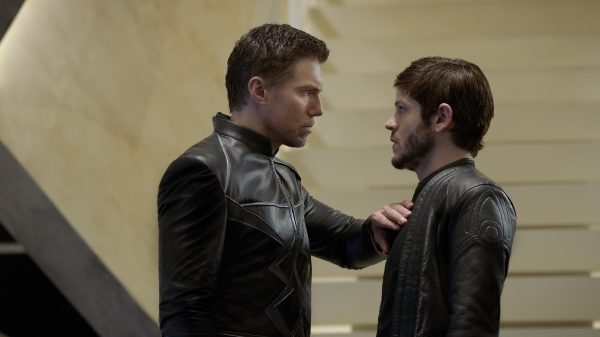Given that tonight’s UK premiere of Marvel’s Inhumans comes nearly a month after its US air date and even longer after the ill-judged IMAX release, I’d wager that you’re already aware of the bad buzz that’s been surrounding this series ever since the first footage was released.
So there’s no point bashing this for the sake of it, and I’m very never interested in doing that anyway. All things considered, Inhumans isn’t nearly as unwatchable as some reviewers would have you believe and, while this is in no sense ‘good’, I can see it appealing to a certain audience who value overblown drama and high-concept sci-fi over things like narrative logic and acting ability.
The titular Inhumans are basically mutants who’ve been forced to live in a secret city on the moon in order to avoid persecution from the human race on Earth. The society is split between the royal family – Black Bolt, Medusa, Karnak, Gorgon, Crystal and Maximus – and miners forced to work basically as slaves in service of our protagonists. At some point around puberty, citizens are tested for ‘inhuman’ abilities and, if they fail, they’re relegated to the working class masses.
Despite being the king’s brother, Maximus is very much against this system, and constantly (rather annoyingly) won’t shut up about returning to Earth. Medusa warns that this would only result in war, but his logic isn’t as faulty as she’d suppose. As we learn later, humans who have lived through the Avengers movies and Agents of SHIELD aren’t actually that bothered by superpowered people.
The other issue is that the world only makes sense if the royals are keeping the citizens there for selfish ends. If the city has been created to house Inhumans who would be persecuted on Earth, why keep the muggles there as workers? This is where the show gets muddled.
So what Marvel appear to have been going for here is a show without obvious heroes. Those at the top of the heap are our protagonists, but they’re essentially 1%-ers who’ve created a society of slaves that immediately casts aside those deemed ‘less than’.
Maximus is the bastard child of this clan, only free from the mines because of his family connections, yet in order to liberate the people he commits truly heinous acts, twisting his moustache as he does so.
This is all good in theory – a complex tale of family loyalty and what it takes to overthrow an unfair system – but in practice there’s no one to root for. You may feel bad for Medusa when Maximus shaves off her hair (a troubling scene for many reasons), but in another show she’d be the bad guy. There’s a difference between flawed characters and hateful ones, and so far Inhumans doesn’t seem to get that.
The first hour of this two-part is definitely stronger than what unfolds after Medusa, Black Bolt, Karnak and Gorgon are evacuated to Earth, with a lot of uninspired fish out of water stuff and an unsubtle performance from Iwan Rheon testing audience patience after the relative peak of Maximus’ coup.
The episode leaves us with the bulk of the main cast on Earth navigating their new reality, with only Crystal and her beloved, giant, teleporting mutt left on the moon. There’s a question of whether Crystal will ultimately switch sides, her parents having been murdered by Black Bolt’s father when she was a child.
Inhumans is bad, but it’s no worse than a lot of network dramas. If the show could figure out who we’re rooting for and why, it has the potential to improve.

